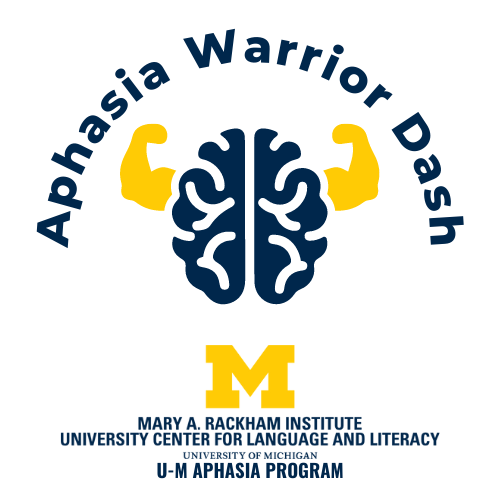Join the University of Michigan Aphasia Program for our inaugural Aphasia Warrior Dash!
An event to celebrate the aphasia warriors in our lives! Walk, run, roll, shuffle, or boogie your way to the finish line, however you are mobile! Complete the 5K in the location of your choice. Funds raised will benefit the University of Michigan Aphasia Program (UMAP), specifically, our mental health fund created in 2023.
Who: Anyone!
What: 5K virtual event (3.1 miles)
When: June 2023 (June 1 – June 30)
Where: Your choice! Run, walk or roll this race wherever you’d like. This is a virtual event.
Cost: Free!
Register: Click here to register.
Donate: Visit our website
The objective of the Aphasia Warrior Dash to bring about awareness of aphasia — the communication disorder that affects more than 2 million people in North America. The race is set for the entire month of June, which is Aphasia Awareness Month. UMAP also continues to raise funds to increase both access to resources and develop awareness efforts. That includes resources such as mental health support for people with aphasia and campaigning to help people understand this common-yet-invisible disorder.
Race Registration Link
Connect With Us!
We are excited to see everyone’s unique race! Follow our Facebook event page, and/or join the Facebook group to connect with other racers. Use the hashtags #aphasiawarriordash23 and #aphasiaawareness so we can follow along.
About The U-M Aphasia Program
The U-M Aphasia Program provides intensive, comprehensive speech-language therapy for people with aphasia, caused by a stroke, brain injury, illness, or other neurological disorder. Aphasia, a communication disorder, can affect a person’s ability to communicate and interact with the world. Aphasia affects not just a person’s ability to communicate, but has far-reaching effects into all aspects of life. Mental health, including confidence, self-esteem, and independence, is often overlooked, but is a recognized need in terms of treating a person with aphasia.
UMAP is one of few intensive, comprehensive aphasia programs (ICAPs) in the country and pioneered the intensive therapy model more than 85 years ago. We have long recognized the need for an aphasia-specific approach, which also extends to mental health and wellness.

